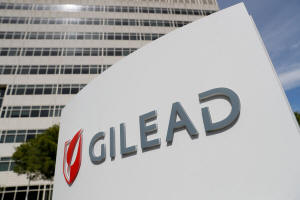Gilead's breast cancer drug gets U.S. FDA approval for third indication
 Send a link to a friend
Send a link to a friend
 [February 04, 2023]
By Raghav Mahobe and Bhanvi Satija [February 04, 2023]
By Raghav Mahobe and Bhanvi Satija
(Reuters) - Gilead Sciences said on Friday the U.S. Food and Drug
Administration had greenlighted the use of Trodelvy for a third
indication, providing another treatment option for patients with the
most common type of breast cancer.
The drug was approved for an advanced form of breast cancer with a
subtype known as HR-positive/HER2-negative in patients, who had stopped
responding to a hormone-based therapy and at least two earlier systemic
therapies.
Gilead's Trodelvy will likely face competition from AstraZeneca-Daiichi
Sankyo's Enhertu, which is approved to treat breast cancer patients with
HER2-low type, a subset of HER2-negative breast cancer.

While analysts said the expanded approval was "widely expected", Cowen's
Tyler Van Buren told Reuters ahead of the decision that he expected
demand for Trodelvy to be "pretty modest", as the survival rate in
patients was lower compared to Enhertu.
Buren expects peak sales of $600 million for the drug in this
indication.
Sales of the drug, already approved for a type of breast and bladder
cancer in the United States, nearly doubled to $680 million in 2022 from
$380 million a year earlier. Analysts on average expect Trodelvy sales
to reach $955.3 million in 2023, according to Refinitiv.
[to top of second column]
|

A Gilead Sciences, Inc. office is shown
in Foster City, California, U.S. May 1, 2018. REUTERS/Stephen
Lam/File Photo
 Gilead, which acquired the therapy
as part of its $21 billion buyout of Immunomedics in 2020, estimates
about 6,000-8,000 U.S. patients will be annually eligible for
Trodelvy with the expanded approval.
Chief Medical Officer Merdad Parsey told Reuters ahead of the
approval that Trodelvy provided a "really important option" for the
late-stage breast cancer with HR-positive/HER2-negative type in
patients, who do not have any other effective option.
Trodelvy works by targeting the cell surface antigen known as Trop-2
on cancer cells and belongs to a class of drugs known as
antibody-drug conjugates.
(Reporting by Raghav Mahobe and Bhanvi Satija in Bengaluru; Editing
by Shinjini Ganguli)
[© 2023 Thomson Reuters. All rights
reserved.]This material may not be published,
broadcast, rewritten or redistributed.
Thompson Reuters is solely responsible for this content.
 |